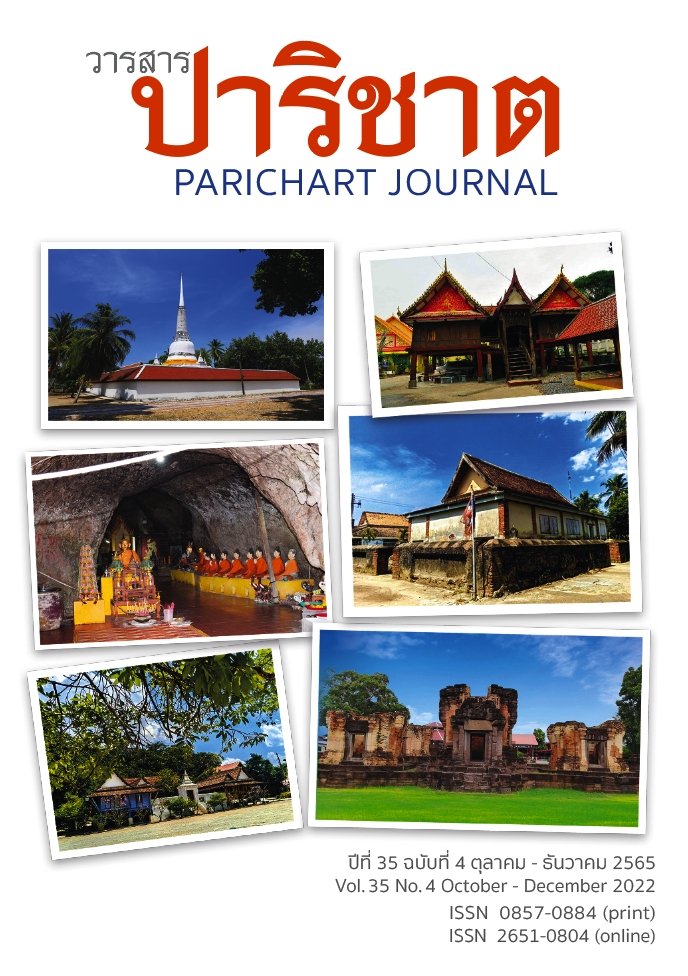Evaluation of Satisfaction towards Internal Benchmarking among Staff of Aditayathorn Building Group at Mahidol University International College
Main Article Content
Abstract
The purposes of this study were to develop a satisfaction assessment model under internal benchmarking process of the Aditayathorn Building Group, Mahidol University International College and investigate the satisfaction assessment results with three cycles assessed by 70, 80, and 61 assessors who are the staff of Mahidol University International College.The assessment instrument was satisfaction questionnaire and Friedman’s Test Statistics was used to compare the level of satisfaction between sub-segments in each assessment cycle. The results of the study revealed that internal benchmarking of satisfaction assessment system could help increase overall satisfaction. This is because when personnel are aware of the weaknesses of the initial assessment, the service can be improved such as duties enthusiastically issue were the lowest scores in first round (mean = 4.24±0.59), but this issue was the highest improvement level of 5.66 percent in the third round. As for the comparison of satisfaction scores among sub-segments, it was found that there were statistically significantly different levels of satisfaction in the first assessment round. However, the satisfaction score was higher in third round and had no difference among sub-segments. The internal benchmarking process enables the implementation of assessment results to improve service quality through the creation of best practices. However, the communication of satisfaction result between executives and staff should be in appropriate way and also consider job satisfaction of staff.
Article Details

This work is licensed under a Creative Commons Attribution-NonCommercial-NoDerivatives 4.0 International License.
References
Donjdee, K., Chancharoen, S., & Harimtepathip, P. (2018). The study of the development of an evaluation of satisfaction skill training program for non-academic personnel of Mahidol University. Journal of Professional Routine to Research, 5, 10-17. (In Thai)
Thailand Quality Award. (2019). TQA criteria for performance excellence framework 2563 – 2564. Eastern Printing & Packaging.
Thanapaisal, S. (2013). TQA (Thailand Quality Award) and EdPEx (Education Criteria for Performance Excellence): The application for performance excellence of educational organizations. T.L.A. Bulletin, 57(2), 71-78. (In Thai)
Duangmanee, A., Areesophonpichet, S., & Sujiva, S. (2013). The development of research management strategies by benchmarking on education criteria for performance excellencz of nursing colleges under the Ministry of Defense. Journal of Nursing and Education, 6(2), 84-99. (In Thai)
Wongwatthanaphong, K. (2017). Application of benchmarking tool in public administration. Journal of Management Sciences, 34(1), 135-159. (In Thai)
Tubtimcharoon, N. (2012). Benchmarking: Management tool that institutions should not overlook. Panyapiwat Journal, 4(1), 97-111. (In Thai)
Pongsawat, P. (2015). Benchmarks of personnel within the organization.Journal of Vocational and Technical Education, 5(9), 46-51. (In Thai)
Camp, R. C. (1989). Benchmarking: The search for industry best practices that lead to superior performance. ASQC Quality Press.
Lekawattana, T., On-Sawad, A., Buosonte, R., & Mejang, S. (2009). The development of an internal quality assurance model for basic educational schools using a benchmarking approach. Research Methodology & Cognitive Science, 6(2), 93-111. (In Thai)
Parasuraman, A., Zeithaml V. A., & Berry, L. (1990). Delivering quality service: balancing customer perceptions and expectations. The free press.
Thongtam, P. (2017). The importance of service quality for business success. Kasem Bundit Journal, 18(1), 219-232. (In Thai)
Bunnoon, P., Thongtang, L., Madsa, T., & Suntiniyompakdee, A. (2020). Satisfaction and behavior of foreign tourists during the vegetarian festival in food routes of Chue-Chang community, tourist attractions at Hat Yai District in Songkhla province. Parichart Journal, 34(1), 42-58. (In Thai)
Saensomboon, A. (2012). Satisfaction evaluation of people to public electricity in section 3 Lamphun Municipalities. [Unpublished Master’s Thesis, Chiang Mai University]. (In Thai)
Duanghasdee, K. (1995). Mental health and job satisfaction of the non- commissioned police officers in urban and rural areas of Khon Kaen province. [Unpublished Master’s Thesis, Khon Kaen University]. (In Thai)
Wongwiwatthananukit, S., Laosrimongkol, K., Bunthamjinda, S., & Chaleaojittikul, S. (2005). Development and validation of an instrument to measure patient satisfaction in drugstores. Thai journal of health research, 19(2), 87-104. (In Thai)
Taib, C. A., Rante, Y., & Warokka, A. (2012). In search of the university quality level benchmarking: Examining the academic library users satisfaction as the anchor of service performance level [Paper Presentation]. Proceedings of the 19th International Business Information Management Association Conference, 4, 2039-51.
Høst, V., & Knie‐Andersen, M. (2004). Modeling customer satisfaction in mortgage credit companies. International Journal of Bank Marketing, 22(1), 26-42.
Young, S. (1993). Checking performance with competitive benchmarking. Professional Engineering, 6(2), 14-15.
Lund, C. M. (1996). Benchmarking patient satisfaction. Best practices and benchmarking in healthcare : A practical journal for clinical and management application, 1(4), 203-206.
Drachman, D. A. (1996). Benchmarking patient satisfaction at academic health centers. The Joint Commission Journal on Quality Improvement, 22(5), 359-367.
Ren, X., & Zhao, Y. (2005). The application of benchmarking in China airlines to improve customer satisfaction [Paper Presentation]. 2005 International Conference on Services Systems and Services Management, Proceedings of ICSSSM'05, 1, 199-203.
Grigoroudis, E., Litos, C., Moustakis, V. A., Politis, Y., & Tsironis, L. (2008). The assessment of user- perceived web quality: Application of a satisfaction benchmarking approach. European Journal of Operational Research, 187(3), 1346-1357.
Cohen, J. (1992). A power primer. Psychological Bulletin, 112(1), 155-159.
Chewa-Kongkiat, Y., & Teerawanviwat, D. (2016). Service quality and customer satisfaction of an email credit card statement service.Journal of Applied Statistics and Information Technology, 1(1), 57-75. (In Thai)
Homhuan, P., & Chantuk, T. (2018). Government personnel’s job satisfaction with public autonomous university. Silpakorn University Journal, 38(5), 80-98. (In Thai)


